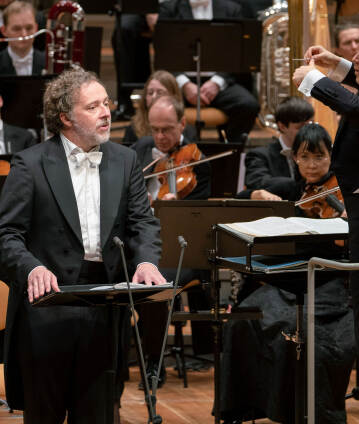Daniel Harding, Frank Peter Zimmermann and Christian Gerhaher

Three particularly close and long-term friends of the Berliner Philharmoniker meet in this concert: the conductor Daniel Harding, the violinist Frank Peter Zimmermann and the baritone Christian Gerhaher. The programme includes Beethoven’s Violin Concerto, which combines tender cantabile from the soloist with vigorous symphonic power. Gustav Mahler’s songs from Des Knaben Wunderhorn, on the other hand, impress with their Romantic, folk-like tone, unfiltered melancholy and subtle humour.
On the occasion of a Berlin performance of Ludwig van Beethoven’s violin concerto – a work launched almost half a century earlier in Vienna – with Joseph Joachim as the soloist, the Neue Zeitschrift für Musikcontended in 1853 that the Berlin audience “quibbles and quips about everything and hence are called the most blasé in the world”. Well, times have changed: these days, local concertgoers are probably – thanks not least to the Berliner Philharmoniker – among the most spoiled in the world musically.
Frank Peter Zimmermann, the musician taking on the solo part in Beethoven’s Violin Concerto at these three Philharmonic concerts, is well-known around the world for meeting the most demanding of expectations. Since his Philharmonic debut in 1985, the violinist, who is originally from Duisburg, has bestowed upon the Berlin audience a series of memorable Philharmonic concert experiences, including the premiere of Matthias Pintscher’s violin concerto en sourdine in 2003 and the German premiere of Magnus Lindberg’s Second Violin Concerto in 2016.
In playing Beethoven’s only contribution to the violin concerto genre, Zimmermann is interpreting a work here initially identified by violinists as unplayable, but later classified by musicologists as the ideal instance of a solo concerto. In fact, the composition makes the highest of technical demands on its soloist, and at the same time impresses with its symphonic structures, particularly in the first movement. Bringing out the latter is the task of Daniel Harding, who, after acting as assistant to Claudio Abbado and Sir Simon Rattle, quickly ascended to the first tier of the younger generation of conductors, and has been artistically associated with the Berlin Philharmonic since 1996.
The second part of the programme consists of selected songs from Gustav Mahler’s cycle Des Knaben Wunderhorn as well as a reunion with an artistic friend of the Berliner Philharmoniker for many years: Christian Gerhaher, who sets standards as concert, opera and Lied singer. After his Philharmonic debut in the 2003/04 season, one has been able to hear the baritone in numerous performances: these include Bach’s St Matthew and St John Passions, Claude Debussy’s Pelléas et Mélisande, Robert Schumann’s FaustScenes and secular oratorio Paradise and the Peri, and Johannes Brahms’s German Requiem – and, of course, time and again as a Lied singer. Gerhaher’s appointment as Artist in Residence in the 2013/14 season marked a high point in his collaboration with the Berliner Philharmoniker.
© 2019 Berlin Phil Media GmbH
Related interviews
Artists
Our recommendations
- Alan Gilbert and Frank Peter Zimmermann with Bartók’s First Violin Concerto
- Bernard Haitink conducts Schubert and Mahler
- Alan Gilbert and Frank Peter Zimmermann
- Memorial concert for Claudio Abbado with Simon Rattle and Frank Peter Zimmermann
- 1993 Europakonzert from London with Bernard Haitink and Frank Peter Zimmermann
- Simon Rattle and Christian Gerhaher